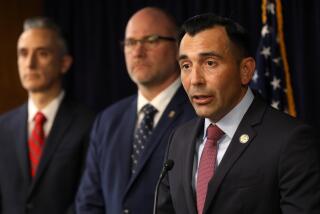New Japan Bank Watchdog Faces Herculean Task
- Share via
TOKYO — Masaharu Hino has a vital role to play in restoring international credibility to Japan’s ailing banking system. However, he may be “fighting against samurai with only his hands,” as a Japanese proverb says.
As commissioner of the nation’s nascent “independent” banking police, the soft-spoken, 62-year-old former prosecutor is trying to transform Japan’s banking regulators from lap dogs into watchdogs.
Japan has come under increasing international pressure in recent weeks to clean up its banking mess, partly in fear that Asia’s spreading financial problems will infect the U.S. and Europe as well.
Japan’s banks are saddled with huge numbers of bad loans, and Hino’s Financial Supervisory Agency has been established by the government to provide “fair and independent” scrutiny of just how extensive those problems are.
But his month-old agency is understaffed, undertrained and undermined by questions of credibility and independence, making success seem like a long shot.
Many of its new inspectors have no financial experience and will be learning during on-the-job audits of the world’s largest banks--while simultaneously taking the agency’s training course: “Financial Inspections for Beginners.”
*
Japan has long dragged its heels in addressing its banking problems. Although most analysts applaud the creation of the agency as at least a step in the right direction, the agency’s start-up struggles do not inspire confidence that the banks’ true financial pictures will emerge.
“Hino may be trying to act independently, but nothing in his budget allows him to do his job efficiently,” said Elizabeth Daniels, banking analyst at Morgan Stanley Japan Ltd. “He lacks computers, training, staff--everything.”
Moreover, most of the people in the agency, which opened in late June, have simply been shifted from Japan’s powerful Ministry of Finance, which had come under fire for maintaining cozy ties with banks it supervised and allowing their bad loans to fester. Japan has few trained financial examiners in its private and government sectors, in contrast to the U.S.
While creation of the agency may have succeeded in reducing the power of the Ministry of Finance, analyst Daniels said, it comes up short in the real objective of improving transparency and oversight in Japan’s banking system.
“This smacks of just undermining the bureaucracy” without enacting true reform, she said.
Japanese banks have disclosed more than $600 billion in bad or questionable loans, but have been reluctant to write them off or set aside reserves to cover them for fear of eroding their capital base.
The bulk of the loans at issue fall into a gray area that includes some with potential to recover and others with grimmer prospects, the banks say. But the criteria for determining which loans will be written off have not been established.
“As we proceed with the inspection process, that criteria will take form,” Hino said in an interview.
*
More fundamental questions have been raised about whether bank shareholders must approve any bank closure that Hino’s team orders, further bringing into doubt its ability to work as an independent, effective agency. Hino acknowledges that this is “one of the crucial issues.”
What’s more, many in Tokyo are skeptical that the banks are disclosing the full extent of their problem loans. Because property values have plunged in recent years, many loans are believed to exceed their collateral property values. In the U.S. banking crisis in the late 1980s and early 1990s, banks and thrifts were forced to write off loans, or put aside enoughmoney to cover possible defaults, if collateral property values dipped below the value of the loan--even if the borrowers had meticulously kept up with payments.
Hino said getting to the truth of the bank’s disclosures will be his top goal, even though he has just 165 inspectors on his 403-member staff and a budget of just $38 million through March 1999.
“Quite a few will be doing inspections for the first time,” he said.
The agency recently boasted that it had hired five accountants from outside the government sector, but even those professionals have never worked for an administrative agency, Hino said.
Hino said he needs twice as many inspectors to do a thorough job. Others suggest 10 times as many would be more adequate to thoroughly examine just Japan’s 19 largest commercial banks, let alone the 128 regional and secondary banks.
Hino said the results of the audits will not be disclosed, probably disappointing the markets as well. Actions that banks make to bolster reserves will be obvious, he said, when the institutions release their financial results every six months.
Nevertheless, Hino is sensitive that mere rumors that the agency is recommending actions could cause even a healthy bank to close--by drying up inter-bank loans that provide liquidity and causing investors and depositors to flee.
“It’s very important for the bank to maintain credibility and maintain assets,” he said. “If we announce the amount of assets, we’re afraid the markets will stop pumping blood to them.”
Nor will the agency close banks immediately, Hino said.
Instead, the agency will tell bank managers that they must make improvements such as beefing up reserves, taking write-offs or cutting expenses.
Hino himself is a relative neophyte, with some experience prosecuting tax fraud and stock cases but little administrative experience.
He is said to have been drafted for the post, which reports to the prime minister, precisely because he is an outsider to the bureaucracy.
“There is some element of a mismatch,” said an economist at a large Japanese bank, who asked not to be named. “The credibility problem is so huge, they found a person not associated with the government or financial institutions that have been so discredited. . . . It’s not the ideal solution.”
But Hino said his independence will help restore the credibility that the institutions desperately need.
“They are not manufacturing widgets or selling things,” he said. “So once people lose confidence or trust in financial institutions, instability comes into play.”
(BEGIN TEXT OF INFOBOX / INFOGRAPHIC)
What’s Ahead for Banking Police
Here are a few of the tough tasks in store for Japan’s new Financial Supervisory Agency:
* Setting criteria for when to close a bank.
* Appointing administrators to take over failed banks, separate the better loans from the worse, and continue lending to healthier borrowers. (Plan awaits parliamentary approval.)
* Training novice inspectors how to examine loans and determine the underlying value of their collateral property. Japan’s property values have nose-dived over the past several years, but determining how much a property might fetch on the open market is particularly difficult, even for experts, during recessions.
* Establishing clear guidelines for when loans will be considered bad, which would require banks to write them off or set aside reserves to cover defaults.
* Persuading Ministry of Finance employees, who have reportedly balked at being transferred to the new agency, that the FSA is a good place to work.
More to Read
Sign up for Essential California
The most important California stories and recommendations in your inbox every morning.
You may occasionally receive promotional content from the Los Angeles Times.













